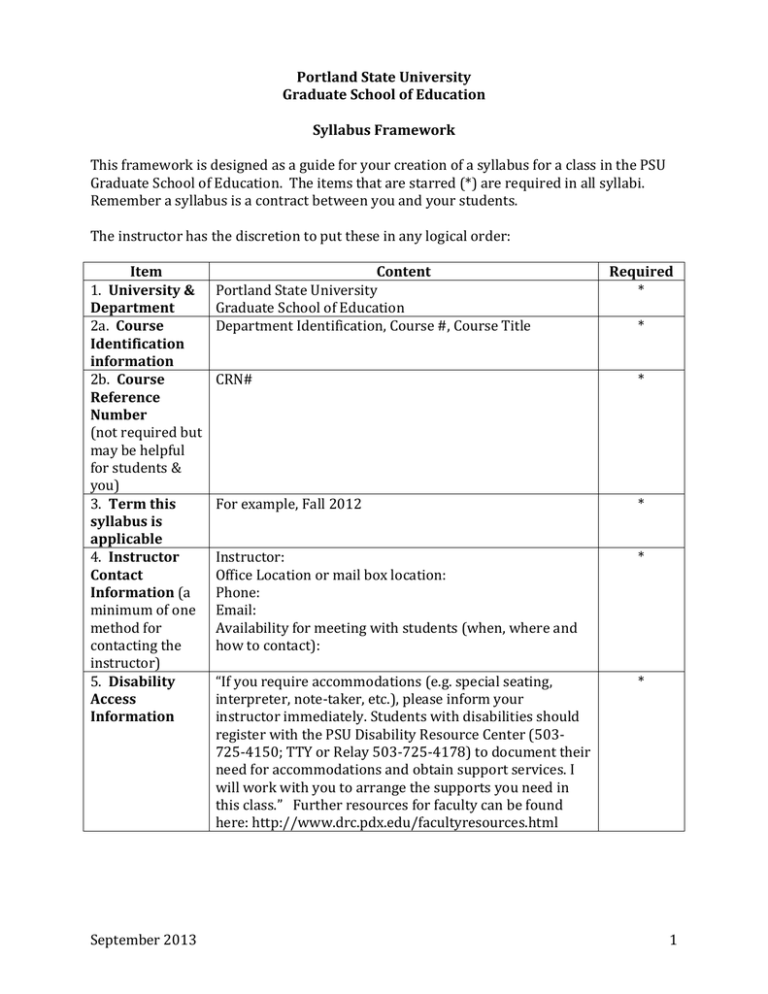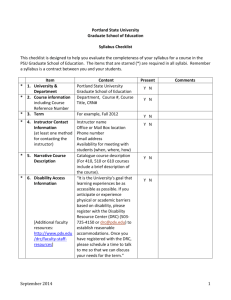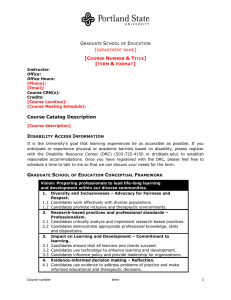Portland State University
advertisement

Portland State University Graduate School of Education Syllabus Framework This framework is designed as a guide for your creation of a syllabus for a class in the PSU Graduate School of Education. The items that are starred (*) are required in all syllabi. Remember a syllabus is a contract between you and your students. The instructor has the discretion to put these in any logical order: Item 1. University & Department 2a. Course Identification information 2b. Course Reference Number (not required but may be helpful for students & you) 3. Term this syllabus is applicable 4. Instructor Contact Information (a minimum of one method for contacting the instructor) 5. Disability Access Information September 2013 Content Portland State University Graduate School of Education Department Identification, Course #, Course Title Required * * CRN# * For example, Fall 2012 * Instructor: Office Location or mail box location: Phone: Email: Availability for meeting with students (when, where and how to contact): * “If you require accommodations (e.g. special seating, interpreter, note-taker, etc.), please inform your instructor immediately. Students with disabilities should register with the PSU Disability Resource Center (503725-4150; TTY or Relay 503-725-4178) to document their need for accommodations and obtain support services. I will work with you to arrange the supports you need in this class.” Further resources for faculty can be found here: http://www.drc.pdx.edu/facultyresources.html * 1 Item 6. GSE Conceptual Framework 7. Narrative Course Description 8. National Professional Standards 9. Required text(s) and materials 10. Course Objectives 11. Class schedule with topics, activities and assignment due dates 12. Procedures and criteria for assessment 13. Course evaluation reminder 14. Differentiated assignment(s) September 2013 Content Vision Statement: Preparing professionals to lead life-long learning and development within our diverse communities. The Conceptual Framework can be found here: http://www.pdx.edu/education/gse-conceptual-framework Introduction to the course Catalogue course description (unless it is a 410, 510 or 610 course, and does not have a catalog description). Will differ by specialty area Required * Books, journals, laboratory materials should all be listed here with enough information for the students to find the materials online or locally. Please use APA style. For assistance go to: http://library.pdx.edu/citing_sources.html. Objectives should be listed and linked to the GSE Conceptual Framework (http://www.pdx.edu/education/gseconceptual-framework), program objectives and TSPC competencies, and/or national standards as appropriate for specialty area. A table or matrix is a useful way to show this information Session by session schedule of classes with dates, topics and assignment due dates. If you anticipate changes in the schedule during the term you may add “subject to change” as appropriate. * A description of all assignments and the extent to which they contribute to the course grade (point value or percent). Rubrics are not required but are strongly recommended. Linking assignments to course objectives is also strongly recommended (this information can be added to the table created for #11 above). Please insert an “assignment” into the final week of your syllabus that reminds students of the importance of completing the online course evaluation. Courses with both undergraduate and graduate students (400/500 courses) must include distinct, substantive requirements for undergraduate and graduate students, i.e., graduate students are required to do additional work beyond what is expected for undergraduates. A distinction can be made by indicating additional readings and/or distinct or additional assignments. Instructors may also want to include separate learning objectives for undergraduate and graduate students, and/or distinct criteria for the final grade. Expecting graduate students to produce higher quality work is not considered sufficient basis for defining the graduate experience. * * * * * * (for all online courses) * (for all 4xx/5xx courses) 2 Item 15. Policy: Late Assignments 16. Policy: Attendance and Tardiness 17. Policy: Classroom Demeanor and Courtesy (highly recommended) 18. Policy: Incompletes (highly recommended) 19. Policy: Academic Integrity (highly recommended) Content No explicit GSE policy. You may create whatever is comfortable for you; however an explicitly stated policy is only fair to students and will avoid future problems. No explicit GSE policy. You may create whatever is comfortable for you. An explicitly stated policy will avoid future problems. Many of our students are working professionals and there is often a balance between their work demands and the rigor we expect from our coursework. No explicit GSE policy. You should however make some statement about classroom demeanor and courtesy, such as: “Because students may not share the same opinions on different topics on this class, it is important that we remember to respect the opinions and ideas of others. We expect all students to show respect and courtesy for all members of this class at all times.” You may want to make reference to the Student Conduct Code: http://www.pdx.edu/sites/www.pdx.edu.education/files/g se_handbook_student_conduct.pdf An explicit PSU policy exists: http://www.pdx.edu/ogs/incomplete-grades Make it clear to students that the instructor is not obligated to give students an Incomplete (I), and that four criteria need to be met to assign an incomplete. In the PSU Student Conduct Code # 577-031-0136 Required The following constitutes conduct as proscribed by Portland State University for which a student or student organization or group is subject to disciplinary action: (1) Obstruction or disruption of teaching, research, administration, disciplinary procedures or other University activities, including the University's public service functions or other authorized activities on University-owned or controlled property, or any other location where teaching, research, administration, disciplinary procedures or other University activities take place. (2) All forms of academic dishonesty, cheating, and fraud, including but not limited to: (a) plagiarism, (b) the buying and selling of course assignments and research papers, (c) performing academic assignments (including tests and examinations) for other persons, (d) unauthorized disclosure and receipt of academic information and (e) falsification of research data. September 2013 3 Item 20. Policy: Returning student work (highly recommended) 21. Student Health Insurance (highly recommended) Content Due to FERPA guidelines, student work must be directly returned to each student (either face to face or via electronic or “snail” mail). It is recommended that instructors let students know that if they want a hard copy of their work returned that they should provide a stamped, self addressed envelope large enough to hold the assignments to be returned. PSU provides students taking 5 or more inload, non selfsupport credits per term (1 credit for international students) with the mandatory PSU/Aetna Student Health Insurance Plan. Required See http://www.pdx.edu/shac/insuranceplan for more information. Students may waive the insurance but must provide proof of enrollment in a comparable insurance policy offered through another company. Students only need to waive out once per academic year. All eligible students will be charged for insurance unless they waive out by the waiver application deadline, the second Sunday of each term. See http://www.pdx.edu/shac/insurancewaiver for specific information and directions about waiving the health insurance, and a link to the online waiver application. 22. LGBTQ Resolution Statement (Recommended C&I Dept.) September 2013 Contact insurancehelp@pdx.edu for more information. As part of its commitment to social justice and human dignity, the Curriculum and Instruction Department demonstrates LGBTQ advocacy through inclusive policies and practices that are both intentionally proactive and strategically responsive. 4




